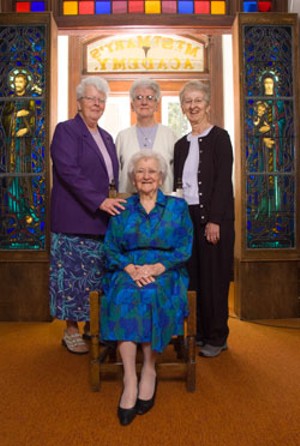Published May 5, 2010 at 8:18 a.m.
Sister Lindora Cabral opens her door even before I reach her front porch and beckons me out of the rain with a warm smile. Inside, I meet her housemates, Helen and Martha O’Brien, fellow nuns in the Vermont Sisters of Mercy and biological sisters. As one takes my coat, the other offers me a warm drink. The custom dates back to their order’s founder, Catherine McAuley (1778-1841), who was renowned for her hospitality and for offering weary travelers “a comfortable cup of tea.”
But little else in this modern household at the end of a Williston cul-de-sac is quaint or old-fashioned. The women’s living room is decorated with Native American dream catchers, an oil painting done by a now-deceased nun, and maps of the world and the United States. Except for a small Jesus statue in the vestibule, no religious icons are on display.
The Sisters themselves are thoroughly modern, too. Habits and headscarves are largely relics of the past; today, most nuns dress modestly but stylishly. Several times during our conversation, Sister. Lindora’s cellphone rings from inside her sweater pocket. The interruptions are understandable and forgivable, since she was recently elected president of the Sisters of Mercy’s Northeast “community” and oversees 800 nuns throughout New England.
An afternoon spent with several Sisters of Mercy is enough to rid one of the usual Hollywood nun stereotypes, from the cloistered do-gooder clueless about life’s gritty realities to the dour disciplinarian who cites scripture and wields a ruler ruthlessly. Today’s Sisters of Mercy are about as far removed as you can get from preachiness, humorlessness or naïveté. Sitting at their kitchen tables, you’re more likely to hear a discussion of health care policy, prison reform, global warming or the Arab-Israeli conflict than a lecture on the Four Gospels.
Far from being sheltered, the Sisters are acutely aware of what life is like for Vermont’s poor, uneducated and disenfranchised citizens. And they probably understand better than most how poverty, especially for women and children, runs deeper than a shortage of cash. Why? Those are the very people the Sisters of Mercy have dedicated their lives to serving.
Last year, a Gallup poll based on more than 350,000 interviews asked Americans if organized religion plays an important part in their daily lives. Only 42 percent of Vermonters said yes — the lowest rate of any state. That may have something to do with the fact that the Roman Catholic Church, Vermont’s most prominent faith, is suffering its worst crisis in centuries. But, while pedophile priests make the news, the Vermont Sisters of Mercy operate effectively under the radar.
Most Vermonters probably don’t realize how many charitable, educational and social- service organizations owe a debt of gratitude, if not their very existence, to these nuns. That’s not surprising, since the Sisters are the last people to trumpet their accomplishments. But run down a list of their good deeds, and you begin to appreciate how widespread their influence is in the community.
Just for starters, a large number of the state’s movers and shakers have been educated by the Sisters of Mercy. Among them are Sen. Patrick Leahy, local real-estate mavens Tony and Ernie Pomerleau, and “Billy” Sorrell, as one of the elder nuns affectionately calls Vermont’s attorney general.
For 75 years, until it closed in 2001, Trinity College in Burlington educated thousands of Vermont’s parochial and public school teachers, including many women who were the first in their families to attend college. UVM’s Trinity Campus owes not just its name but its infrastructure to the onetime all-women’s Catholic college, which the Sisters of Mercy founded in 1925.
Likewise, McAuley Square, the 74-unit affordable-housing project in Burlington, was built on land owned by the nuns and bears the name of the order’s Irish founder.
Today, members of the Vermont Sisters of Mercy can be found on the boards of numerous social-service agencies and charitable organizations, including the United Way, Opportunities Credit Union, Vermont Interfaith Action and the Visiting Nurse Association. As Sister Lindora points out, when one sister leaves a board, another is often nominated to replace her. The organization heads know that nuns are tireless workers and understand their missions.
Like many of the Sisters, Lucille Bonvouloir, now 67, became a nun as a teenager because she wanted to serve others in an age when such opportunities for women were much more limited than they are today. In addition to the three vows of poverty, chastity and obedience that all nuns take, the Sisters of Mercy swear a fourth vow to serve the poor and uneducated, especially women and children.
To that end, Sister Lucille, whose last name literally means “good will” or “good wish,” is one of the nuns who founded the Committee on Temporary Shelter (COTS) in 1982. She opened the shelter, which she ran for 10 years, after observing an unmet need for emergency food and housing in the city.
“We were seeing people gathering and sleeping on the streets,” Sister Lucille recalls, “and we were very concerned that someone would end up freezing to death.”
Like most of the sisters, Lucille has also taught at numerous schools, including Christ the King and Mater Christi in Burlington, St. Monica School in Barre and Rice Memorial High School in South Burlington. Officially, she’s now “retired” — a term that, as one nun jokes, just means she doesn’t get paid for her work anymore. In fact, Lucille still teaches English twice a week to new immigrants.
After Trinity closed in 2001, the Sisters of Mercy sought a new “ministry” where they could continue fulfilling their vow of service to the poor and uneducated. And so Mercy Connections was born. Today, the nonprofit has numerous facets, including the Women’s Small Business Program, the Education and Transition Center, and the Vermont Women’s Mentoring Program.
Central to its core mission is helping women make the transition out of correctional facilities. Last May, the nonprofit launched a pilot project with Chittenden County State’s Attorney T.J. Donovan. “Gettin’ Ahead” is a 10-week, 50-hour program that diverts female offenders who’ve committed petty offenses out of the criminal justice system and provides them with tools for getting their lives back on track.
Since the program began last year, 15 women have “graduated”; in that time, only one has reoffended and been sent back to prison. Two of the graduates are now cofacilitators of the program and help other women who struggle with the same challenges they did.
The Sisters of Mercy don’t just work on the fringes but often wade right into the thick of controversies. Many Vermonters would recognize Sister Miriam Ward, the 84-year-old peace activist who founded Pax Christi Burlington. The diminutive, fiery nun often can be found holding a sign on Friday afternoon at the top of Church Street for the weekly antiwar vigil. Miriam has also traveled to the Middle East numerous times to protest the unjust treatment of the Palestinians, and to Georgia to voice opposition to the School of the Americas, the U.S. Army’s training facility for counterinsurgents.
The Sisters of Mercy don’t just work to effect change from the outside, either; they have served in some of the state’s highest policy positions. Sister Elizabeth Candon, now 88, was president of Trinity College from 1966 to 1976. Shortly after her “retirement,” the Vermont Democratic Party asked her to help Stella Hackel run for governor against Richard Snelling. “I have a tendency to say yes too easily,” Sister Elizabeth admits.
Hackel was soundly trounced. But, to the surprise of everyone, Snelling tapped Sister Elizabeth to be his secretary of human services. It was highly unusual for a Republican to pick a Democrat, a woman and a nun for that post. But, according to Elizabeth, the choice seemed divinely inspired.
“When you serve the sick, the poor and the uneducated, I just thought it was something made in heaven,” she recalls. “It was a glorious experience.”
But it was not without controversy. In those years, federal Medicaid funds could still be used to fund abortions — and, as secretary of human services, Sister Elizabeth had to administer them. For a time, the bishop chastised her for accepting that money. The way the conflict panned out speaks volumes about the Sisters of Mercy and their commitment to justice. Though the sisters didn’t all agree with her, they stood behind Sister Elizabeth’s decision to grant women in poverty the same opportunities as everyone else.
The Sisters may not describe themselves as “liberal,” but it’s hard to see them as promoting anything other than progressive values. That’s evident when you meet Sister Janice Ryan, who served as Trinity College’s president from 1979 to 1996. Shortly thereafter, she moved to Washington, D.C., and became director of the Catholic Campaign to Ban Landmines. Later, she was asked by then-Senator Jim Jeffords to help him craft a national education bill. Over the years, Sister Janice also worked on nuclear threat reduction and criminal justice reform.
On her return to Vermont in 2003, Sister Janice was invited by then-Corrections Commissioner Steve Gold to serve as deputy commissioner of corrections, responsible for overseeing the operations of all Vermont prisons. As she puts it, “It was a privileged position, and tough.”
But toughness is a common trait among the nuns. I ask Sister Janice what other qualities characterize the Sisters of Mercy, and whether they’re related to the history of the order itself. She explains that Catherine McAuley, who founded the order in Dublin in 1830, never actually intended to start a religious congregation. Rather, her goal was simply to provide housing and education to poor and uneducated women, especially domestic servants and former prostitutes trying to escape their profession.
But, pressured by the church, McAuley agreed to found the order, provided the sisters weren’t cloistered behind convent walls. The Sisters of Mercy soon became known as “walking nuns” because they traveled by foot in pairs, doing their work in the community.
Ever since, the Sisters of Mercy have continued to walk the walk, earning a reputation not for their words but for their deeds. As Sister Janice puts it, “It’s the Gospel based in action. It’s not just about what the Bible says. It’s about what the Bible says to do.”
Today, the Sisters face the same challenge as the male priesthood in attracting young people. They all acknowledge that their community will not look the same in 20 years as it does today. Nevertheless, they have efforts under way to attract young women into the fold, even if they’re only “associates” who share their work ethic and service but don’t take the same vows.
And, although the Sisters labor well into their seventies and even eighties, life in “the sisterhood” appears rich, joyous and full of laughter. Indeed, many of the oldest Sisters seem young at heart, as if all their good deeds have taken years off their lives.
“Some people looking in from the outside think there are ‘constraints’ on our lives,” says Sister Elizabeth. “But I couldn’t imagine a happier life. Really!”
Want to learn more?
Mercy Connections’ Third Annual “Spring Luncheon” will celebrate the 135-year legacy of community service of the Vermont Sisters of Mercy on Tuesday, May 18, at 11 a.m., at the Sheraton Conference Center, South Burlington. Info and tickets, 846-7063.
More By This Author
About the Artist

Matthew Thorsen
Bio:
Matthew Thorsen was a photographer for Seven Days 1995-2018. Read all about his life and work here.
Matthew Thorsen was a photographer for Seven Days 1995-2018. Read all about his life and work here.
Speaking of Local Issues
-

At the Junction of State and Federal Law, I-91 Checkpoint Becomes Site of Legal Collision
Feb 5, 2014 -

Maple Makeover? Vermonters Discover a New Sugaring Technique
Feb 5, 2014 -

Disharmony on Prospect Street: A Dispute Between Neighbors Strikes a Sour Note
Feb 5, 2014 -

Treatment or Trial? Growing 'Rapid-Intervention' Program Gives Addicted Offenders a Choice
Jan 29, 2014 -

Raw Deal? Farmers Push Back Against Unpasteurized Milk Regulations
Jan 29, 2014 - More »
Comments
Comments are closed.
From 2014-2020, Seven Days allowed readers to comment on all stories posted on our website. While we've appreciated the suggestions and insights, right now Seven Days is prioritizing our core mission — producing high-quality, responsible local journalism — over moderating online debates between readers.
To criticize, correct or praise our reporting, please send us a letter to the editor or send us a tip. We’ll check it out and report the results.
Online comments may return when we have better tech tools for managing them. Thanks for reading.














































